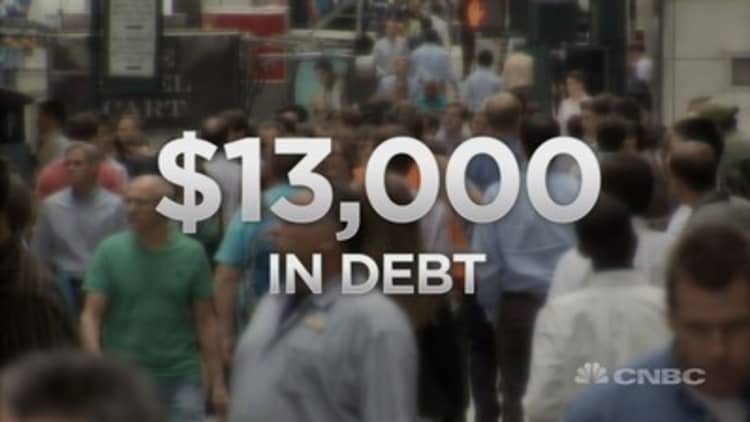
The prospect of a Federal Reserve interest rate hike has plenty of investors on edge, but there is also another group that needs to take notice ... people who carry a balance on their credit cards.
Consumers have been taking on more credit card debt, and they are not paying it off every month. If interest rates rise, that behavior could become significantly more costly.
Total credit card debt stood at $901 billion in May, according to Federal Reserve data, up 3.19 percent from a year earlier and up further, from $839.5 billion, as of the end of 2010. It is the third largest type of household debt, after mortgages and student loans. And a Nerdwallet analysis of Fed data found that among households with credit card debt, the average balance stood at $15,863 as of July. (Tweet This)
Credit card debt is not spread equally across the country. A survey by CreditCards.com found that San Francisco is the metro area with the lowest credit card balances, and San Antonio had the highest.
It would be one thing if people were paying off their card balance each month. But a newly released survey by Prosper, a peer-to-peer lending platform, found that just 37.4 percent of credit card holders pay their balance in full each month, and 15.9 percent pay only the minimum balance. (Tweet This)
The National Foundation for Credit Counseling calculated that some 35 million people are rolling over at least $2,500 in credit card debt every month.
With an interest rate hike, "the same amount of debt that Americans are carrying is going to get more expensive—but the problem is they are carrying more debt every year," said Sean McQuay, credit card associate at Nerdwallet. Using current average household credit card debt, he calculated that a 1 percentage point rate hike would cost that household $160 per year. In the aggregate, consumers would pay $9 billion more per year in credit card interest.
Most Fed watchers expect the central bank to raise rates initially by a 0.25 of a percentage point in September.
The news on credit card debt is not all bad. A survey for the National Foundation for Credit Counseling found that the percent of households with credit card debt has been steadily declining, from 44 percent in 2009 to 34 percent in 2014.
In addition, the share of people paying off their balance seems to be gradually increasing, according to Matt Schulz, a senior analyst at CreditCards.com. The American Bankers Association calculated that so called transactors, people who pay their balance every month, accounted for 29.2 percent of credit card accounts in the fourth quarter of 2014, up 0.5 percent from fourth quarter 2013.
"The number of people I see paying off their balance is still not enough people, but it's good that that number is climbing," Schulz said.
Credit card delinquencies have been falling as well, but McQuay is not impressed. "In the financial crisis, a lot of people declared bankruptcy, so banks had to write off their credit card debt and it comes out delinquency rate. I don't really read the delinquency rate being so low as such a big thing," he said. "I don't think it was consumers paying off their credit card debt that really moved that needle."
Consumers have several options for reducing the pain of shaving away credit card debt, experts said. One is to contact the issuer and inquire about waiving a late fee or reducing the interest rate on the card, said Schulz. A CreditCards.com survey found that when people asked about waiving fees they were successful 80 to 85 percent of the time, and they were able to reduce card interest rates about 60 percent of the time. (It would also help to know the interest rate: Prosper found that just 48 percent of cardholders do.)
Another option is to take advantage of a zero interest balance transfer offer, Schulz said. An interest rate hike "might make zero percent balance transfers an endangered species," he said, but consumers who act quickly can buy some time to whittle away their debt. Consumers need to be careful to obey all the terms of a transfer, though, since any misstep may put them at risk of having the zero percent offer revoked.
McQuay offered an old fashioned solution: paying attention. "Finances don't need to be exciting to be effective," he said. "People just need to write down what they are spending and where they are spending it." Then, he said, just chip away.
Correction: The survey that found an 80 to 85 percent success rate for waiving fees was misattributed. It was conducted by CreditCards.com.




